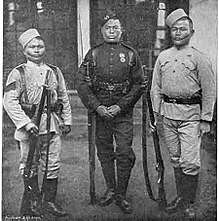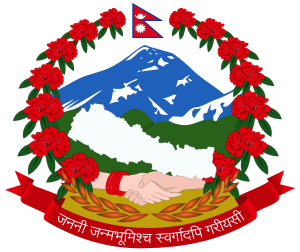List of Brigade of Gurkhas recipients of the Victoria Cross

The Victoria Cross (VC) is a military decoration that may be bestowed upon members of the British or Commonwealth armed forces for acts of valour or gallantry performed in the face of the enemy. Within the British honours system and those of many Commonwealth nations it is the highest award a soldier can receive for actions in combat.[1] It was established in 1856 and since then has been awarded 1,356 times, including three service personnel who were awarded the VC twice.[2]
The British Army's Brigade of Gurkhas, a group of units composed of Nepalese soldiers—although originally including British officers—has been a part of the Army since 1815. When raised it originally focused on conflicts in the Far East, but the transfer of Hong Kong from British to Chinese hands necessitated that the brigade move its base to the UK. A battalion is still maintained in Brunei and as at 2016, units serve in Afghanistan.[3]

Since the VC was introduced it has been awarded to Gurkhas or British officers serving with Gurkha regiments 26 times.[4] The first award was made in 1858 to a British officer of the Gurkhas, John Tytler, during the campaigns that followed the Indian Rebellion of 1857, while the first award to a native Gurkha, Kulbir Thapa, was in 1915 during the First World War. When the Victoria Cross was initially established, Gurkhas, along with all other native troops of the British East India Company Army or the British Indian Army, were not eligible for the decoration and as such, until 1911, all of the Gurkha recipients of the award were British officers who were attached to Gurkha regiments.[5] Until that time the highest award that Gurkhas were eligible for was the Indian Order of Merit. Since 1911 however, of the 16 VCs awarded to men serving with Gurkha regiments, 13 have been bestowed upon native Gurkhas.[4] The most recent award was made in 1965 to Rambahadur Limbu, during the Indonesia–Malaysia confrontation.[4] Along with the Royal Green Jackets, the Gurkha regiments are among the most heavily decorated Commonwealth units.[6]
In 1950, when India became a republic, Gurkhas serving in the Gurkha regiments of the Indian Army lost their eligibility for the Victoria Cross and they are now covered under the separate Indian honours system. Under this system the Param Vir Chakra (PVC), which is India's highest military decoration for valour,[7] is considered to be equivalent to the Victoria Cross. As such only those serving in the Gurkha units of the British Army remain eligible for the Victoria Cross.[2]
Recipients
This along with the *, indicates that the Victoria Cross was awarded posthumously.
Notes
References
- Specific
- ↑ "Victoria Cross: The Premier Award for Gallantry". Ministry of Defence (UK). Retrieved 1 August 2009.
- 1 2 "Victoria Cross". Ministry of Defence (UK). Retrieved 27 December 2009.
- ↑ "Brigade of Gurkhas". British Army. Retrieved 12 July 2016.
- 1 2 3 Parker 2005, pp. 391–393.
- ↑ Parker 2005, p. 62.
- ↑ "The world's most exclusive club". Ministry of Defence. 30 April 2007. Archived from the original on 9 June 2007. Retrieved 16 June 2007.
- ↑ "Param Vir Chakra". Pride of India.net. Archived from the original on 25 May 2011. Retrieved 29 May 2009.
- ↑ "Glossary: S". British Library. Retrieved 8 December 2009.
- ↑ "No. 22176". The London Gazette. 24 August 1858. p. 3903.
- ↑ "No. 23902". The London Gazette. 27 September 1872. p. 4489.
- ↑ "No. 24314". The London Gazette. 14 April 1876. p. 2476.
- ↑ "No. 24697". The London Gazette. 18 March 1879. p. 2241.
- ↑ "No. 24843". The London Gazette. 11 May 1880. p. 2968.
- ↑ "No. 26165". The London Gazette. 26 May 1891. p. 2805.
- 1 2 "No. 26306". The London Gazette. 12 July 1892. p. 4006.
- ↑ "No. 27584". The London Gazette. 7 August 1903. p. 4976.
- ↑ "No. 27636". The London Gazette. 15 January 1904. p. 331.
- ↑ "No. 27758". The London Gazette. 24 January 1905. p. 574.
- ↑ "No. 29371". The London Gazette (Supplement). 16 November 1915. p. 11450.
- ↑ "No. 30122". The London Gazette (Supplement). 8 June 1917. p. 5702.
- ↑ "No. 30757". The London Gazette (Supplement). 18 June 1918. p. 7307.
- ↑ "No. 36053". The London Gazette (Supplement). 11 June 1943. p. 2719.
- ↑ "No. 36190". The London Gazette (Supplement). 28 September 1943. p. 4347.
- ↑ "No. 36764". The London Gazette (Supplement). 26 October 1944. p. 4900.
- ↑ "No. 36785". The London Gazette (Supplement). 7 November 1944. p. 5129.
- ↑ "No. 36742". The London Gazette (Supplement). 10 October 1944. p. 4673.
- ↑ "No. 36860". The London Gazette (Supplement). 26 December 1944. p. 5933.
- ↑ "No. 36730". The London Gazette (Supplement). 3 October 1944. p. 4569.
- ↑ "No. 36950". The London Gazette (Supplement). 20 February 1945. p. 1039.
- ↑ "No. 36715". The London Gazette (Supplement). 26 September 1944. p. 4423.
- ↑ "No. 36690". The London Gazette (Supplement). 5 September 1944. p. 4157.
- ↑ "No. 37195". The London Gazette (Supplement). 24 July 1945. p. 3861.
- ↑ "No. 37107". The London Gazette (Supplement). 1 June 1945. p. 2831.
- ↑ "No. 43959". The London Gazette (Supplement). 21 April 1966. p. 4947.
- General
- Parker, John (2005). The Gurkhas: The Inside Story of the World's Most Feared Soldiers. Headline Book Publishing. ISBN 978-0-7553-1415-7.
